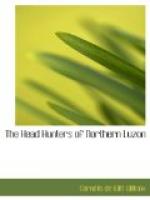In a few minutes we had crossed and landed at Tuguegarao, the capital of the province, and still retaining traces of its wealth and importance in the great days of the tobacco monopoly. It has an imposing church built of brick, a hospital, and a Dominican college, all of substantial construction; its streets are broad and well laid out, but of the town itself not much can be said, as a fire swept off most of it a few years ago. Still Filipino towns rise easily from the ashes, and there is no reason why prosperity should not again smile upon this ancient borough.
We tarried two or three days in Tuguegarao, waiting for river transportation and meanwhile greatly enjoying the hospitality so generously shown us. Major Knauber, of the Constabulary, and Mr. Justice Campbell, of the Court of First Instance, invited me to stay with them in a fine old Spanish house they had together. Every evening Herr ——, of the —— Company, had us to dinner in his beautiful bungalow. At a grand baile given us the day after our arrival, Heiser asked me if I had not dined that day and the day before at Herr ——’s; on my saying yes, he laughed and remarked that he had just taken up his cook as a leper to be sent to the leper hospital on the Island of Culion. But in the East nobody bothers about a thing like that.
Tuguegarao is a point of departure for some interesting trips, notably one to some limestone caves, larger than the Mammoth Cave of Kentucky. In one of these caves, receiving light, air, and moisture from fissures in the natural surface of the ground, palms (cocoa and other), bamboos, and other plants and trees are growing in natural miniature. I was told that this cave was fascinating and that I ought to go and see it. But time was pressing; although the commanding General had set no limit on my absence, I felt I ought now to return. Accordingly, on the morning of the 18th, our transportation being ready, Mr. Justice Campbell and I went aboard a motor-launch and set out for Aparri, at the mouth of the river.
All river trips here in the East have an interest; this one proved no exception to the general rule, though it presented nothing especially worthy of record. But the Rio Grande is the great road of the Valley, to such an extent, indeed, that there are no land roads to speak of. We passed between low, muddy banks, frequently of uncertain disposition, as though wondering how much longer they could possibly resist the wash of the current. The stream itself is shallow, uncharted, unbeaconed; its navigation requires constant attention, which it certainly got this day from our quartermaster, who remained on duty for ten consecutive hours. We had the ill-luck not to see a single crocodile, although the river is said to be full of them, all of ferocious temper. On the other hand, we did see the oddest possible ferry: a bundle or raft of bamboo, with chairs on top, towed across stream by a carabao regularly hitched up to it and getting over himself by swimming. This he does on an even keel, his backbone being entirely out of the water when under way.




